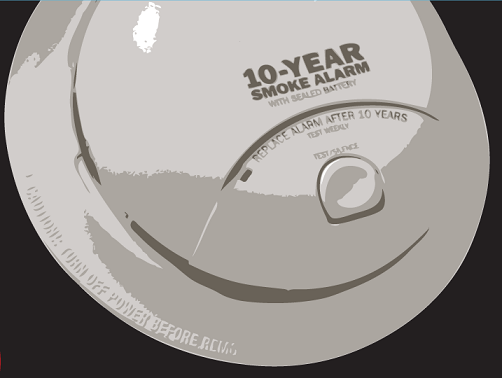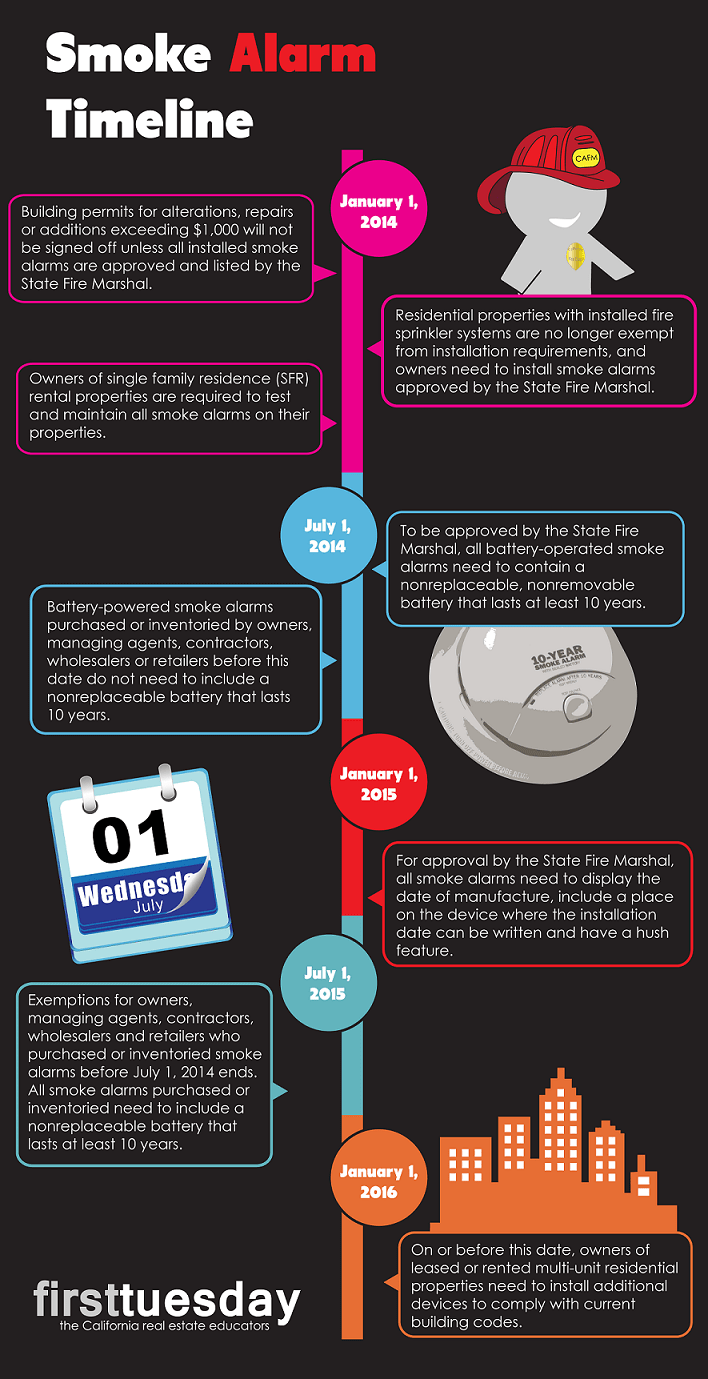Where there’s smoke, there’s fire — and, if you’re compliant with the law, a smoke detector, too! Read on to ensure you and your clients comply with new and existing rules controlling smoke alarms in residential properties.
A part of all residential properties
Smoke alarms approved by the State Fire Marshal are required to be placed in all residential properties in California. The State Fire Marshal lists all approved smoke alarms. [Calif. Health & Safety Code §13113.7]
Beginning July 1, 2014, the State Fire Marshal required all battery-operated smoke alarms to contain a non-replaceable battery that lasts at least ten years. [Health & S C §13114(b)]
Beginning January 1, 2015, the State Fire Marshal required all smoke alarms (battery-powered, or powered by electricity) to:
- display the date of manufacture;
- provide a place where the date of installation can be written; and
- incorporate a hush feature.
Operable hardwired and battery-operated smoke alarms which were approved and listed when they were installed don’t need to be replaced immediately. [Health & S C §§13113.7(a)(4); 13113.7(d)(3)]
Editor’s note — Local ordinance may require replacement sooner. [Health & S C §13113.7(a)(4)]
When an existing smoke alarm no longer works, the replacement smoke alarm is to meet all new requirements.
Smoke alarms are not required if a State Fire Marshal-approved fire alarm system with smoke detectors is installed on the property. An existing fire sprinkler system no longer exempts a residential property owner from smoke alarm installation requirements. [Health & S C §13113.7(a)(5)]
Violations of smoke alarm rules incur a maximum fine of $200 for each offense. [Health & S C §13113.7(e)]
Smoke alarm rules for rentals
If your client owns a multi-unit residential property or a single family residence (SFR) rental property, they are required to install, maintain and test smoke alarms on their property. [Health & S C §13113.7(d)(2)]
Owners (or property managers, as owners’ agents) are required to ensure smoke alarms are operable when a new tenancy is created. [Health & S C §13113.7(d)(2)(B)]
To ensure safe conditions, residential rental and lease agreement forms include a provision requiring the landlord to comply with all safety ordinance and regulations, including smoke alarm law. [See RPI Forms 550 §7.3 and 551 §7.2]
However, tenants are responsible for notifying the owner or property manager if the smoke alarm becomes inoperable. The owner is not in violation of smoke alarm requirements if they are unaware of a malfunction in the smoke alarm after the tenant is given possession. [Health & S C §13113.7(d)(2)(B)]
An owner responds to a tenant’s notification of an inoperable smoke alarm in their unit by correcting the defect. 24-hour written notice is given to the tenant before the owner or their agent enters and performs the repairs. Repairs are performed only during business hours. [Health & S C §13113.7(d)(2); see RPI Form 567]
Additionally, owners of any residential rental property are to install additional smoke alarms to ensure devices are located in accordance with current local building standards. [Health & S C §13113.7(d)(3)]
In California, smoke alarms are to be installed on each floor, in each sleeping room and in the immediate vicinity outside of the bedrooms (i.e. a hallway). Proper smoke alarm placement also depends on local ordinance. [Calif. Building Code §R314.3]
Smoke detector laws don’t mandate the frequency of owner inspections. However, landlords have a duty to inspect the premises upon entry for any purpose. Inspections need not be thorough, but landlords are liable for any dangerous condition that is observable by a reasonable person. [Mora v. Baker Commodities, Inc. (1989) 210 CA3d 771]
Thus, if a smoke alarm defect can be reasonably ascertained visually during a landlord’s visit to the unit, the landlord needs to repair or replace the device.
Enforcement on a building permit
Additionally, smoke alarm enforcement is triggered when a residential property owner seeks a building permit for alterations, repairs or additions costing more than $1,000. Building permits will not be issued until the owner has provided proof that State Fire Marshal-approved smoke alarms are in place and operable. [Health & S C §13113.7(a)(2)]
This does not require the owner to replace any older, operating smoke alarms, but older smoke alarms are required to have been approved by the State Fire Marshal at the time of installation. [Health & S C §13113.7(a)(4)]
Enforcement on a transfer of a single family residence
Enforcement of smoke alarm rules is also triggered on the transfer of a single family residence (SFR). Sellers certify the property is in compliance with smoke alarm rules on the Transfer Disclosure Statement (TDS). The certification — TDS — is handed to the buyer as soon as practicable (ASAP) before the seller enters into a purchase agreement or counteroffer. [Health & S C §13113.8(b)-(c); see RPI Form 304]
Related article:
This article was previously posted in 2014, and has been updated.
Check out our smoke alarm timeline below for a quick snapshot of when these laws go into effect (click to expand):
















I rent a home in NJ. All my smoke detectors went at one time. I informed my landlord but after line 2 months of waiting, I got 4… We still need 3… Who is responsible (by law) for replacing them? The city inspector told me 3 needed to be replaced… why not tell my landlord?
I have lived in same apartment in San Francisco since 1982 and for the first time about 6 months ago an alarm sounded from the smoke alarm. The landlord told me that it was my responsibility to replace the batteries. Is this the law? Please advise, and maybe include this information when you update the article. Landlord suggested I change batteries when clocks change in the spring and fall.
Actually the landlord is responsible for a yearly check and to change batteries. A tenant should not have to risk climbing up a ladder to do so. What would happened had you been an elderly person? He is responsible and by law he is. Stake your claim.
Why don’t the government tell the truth they issued these laws without talkig to anyone other than the makers of smoke detectors did anyone see how much these companies paid off the polititions to past stupid laws so they can make a lot of money for years and years one properly placed smoke detector worked well but once installed you did not have to put 3-5 new smoke detectors and those companies wanted more money no where does it show that all these added smoke detector has even saved one life over a well placed smoke detector for a house and no where did any of the reporters reported that is was being voted on or even dicused before the law came into being now doesn’t that look like big time corupyion in the back room
We have a shelter in place in califirnia but there are no smoke alarms in our house. The inspector contacted the owner. No action yet.. I have a month to month but want to know can i leave without giving 30 day notice if the hone is unhabitable with no smoke detector and no carbon monoxide. Thanks
I think it is moronic to have 4 smoke alarms in a 2 bedroom apartment. One was perfect and working well for us in the hallway. Then they added the living room and I was okay with it. But are they bloody kidding me, when they installed two more smoke alarms in both bedrooms.. Why like seriously why?. I’m so sick of my management, the weridos who came up with this idea. Why can’t we as renters choose how many alarms to have. No one asked us, they just came into our home when no was home and installed it and We have to live with a blinking light all night. And once these alarms in the bedrooms run out of battery and blares mostly when you least expect it. I’m 100% against smoke alarms in bedrooms, and there needs to be a change in this ridiculous law.
***Upset Californian renter now having to live with a smoke alarm in two bedrooms and another two in the home
P.s we don’t smoke and I understand their are dangers and 1 or 2 smoke alarms might be useful, but never will I believe four is normal in a two bedroom apartment with less than 1,500 ft. Agh
Sara, why are you against smoke detectors in bedrooms? What would you do if you sleep with your door closed, and an electric circuit in your wall catches fire? …..no notice given before you pass out from smoke?
Bravo Edith! Thank you.
they should also ban motorcyles, they are unsafe, and alcohol causes men to beat their wives, ban alcohol!
My landlord told me not having a smoke detector is “Grandfathered” in, as I live in a small cottage home on a commercial lot. The tiny house was built in 1919, and will not install one. Does anyone know any truth to this issue?
No. Unless your tenancy started in 1919. If you read the law, it’s based on the start of tenancy and once a tenant informs the landlord that one is malfunctioning, they still have an obligation to replace it. What is grandfathered is the type of alarm..ie., if you have one of the old ones that works…you dont need to replace it with the ones that have built in batteries or have date of manufacter. If it was the age of home…none of the homes would require before lets say 1970s. Your landlord is wrong.
This article says they’re required in in every sleeping room, but http://homeguides.sfgate.com/landlord-provide-smoke-detectors-55847.html states they’re required immediately outside every room. Which one is correct?
(I’m also assuming that if several rooms have doors leading to a common area is close proximity, one device will suffice for all the rooms?)
Also, to the person saying they cost $5 or $10. That’s not true. They’re more expensive than that, especially if you have to by multiple of them, it adds up. Of course, that’s irrelevant, because whatever the price, it’s still worth the cost of losing a life.
R,
Smoke alarms are required both immediately outside of the bedrooms and in each sleeping room per California Building Code §R314.3, which states:
Smoke alarms shall be installed in the following locations:
1. In each sleeping room.
2. Outside each separate sleeping area in the immediate vicinity of the bedrooms.
3. On each additional story of the dwelling, including basements and habitable attics but not including crawl spaces and uninhabitable attics.
The California Department of Forestry and Fire Protection (CAL FIRE) also reiterates this information on their web site here.
We have added this information to the article for more clarity.
Regards,
ft Editorial Staff
Bravo!! Saving lives is the ultimate goal in our society.
Where do I get a battery that lasts 10 years?
Where do we get 10 year batteries?
You have to buy new smoke detectors with the 10 year lithium batteries in them
Ron: About 3500 people die in US residential fires each year. That’s not “no one,” especially when it’s your daughter who is needlessly killed. When $5 or $10 fire alarms save lives, it’s embarrassing that you would advocate putting your family or your tenants at risk to save pocket change. Why do you ignore the truth of human tragedy to sustain your irrational, cynical, and partisan ideology?
Gerry: Of course buyers should be informed by a competent real estate agent before making an offer. But the current requirement is much less a burden and much more practical than trying to prevent a buyer from making an offer until the disclosure is given.
Ashley: Hard wired smoke detectors do NOT have to change, as long as they complied with existing standards when they were installed.
they should ban alcohol also ! Alcohol causes men to beat their wives and molest their kids in many instances
Leave to an unbridled legislature to come up with new laws that aid or benefit almost no one . I sure hope the voters of this state begin to realize what this is doing to our economy (killing it) and replace some of these ‘feel good’ legislatures with people of responsibility. The two things Democrats know how to do ;regulate your life and spend your money!
Give us a break! As usual the regulators get it backwards. Advise the Buyer of smoke detector compliance on the TDS before they write an offer! Come on. Let’s get real. Gerry
What about hard wired smoke detectors? Will home owners have to change those out as well?
Dear Ashley,
The laws and regulations were a bit unclear on this point. However, we did confirm directly with the Office of the State Fire Marshal that all smoke alarms — hardwired or battery-operated — are considered compliant if they met the requirements of the law when they were installed. Thus, hardwired smoke alarms only need to be replaced when they become inoperable. Replacement devices need to meet the requirements existing at the time of replacement.
Thank you,
first tuesday Editorial Staff
I have a client with a hard wired smoke detection system. We are in escrow. What are my seller’s responsibilities?
I am in escrow single family residence, the seller does not have smoke detectors in 3 bedrooms.
Does the seller prior to closing escrow have to install smoke detectors in the 3 bedrooms?
To make sure they are operable, and that they are installed in the required locations.